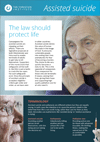An elderly assisted suicide activist has ended her life at a Swiss suicide clinic even though she was not suffering from a terminal illness.
Critics have warned that Nan Maitland’s death, at the age of 84, exposes the “real agenda” of euthanasia activists.
Mrs Maitland, a founder of the campaign group Society for Old Age Rational Suicide, suffered from arthritis and described her life as consisting of “more pain than pleasure”.
Exposes
But Dr Peter Saunders, from the Care Not Killing Alliance, warned: “This case, involving an elderly woman with arthritis who was actively assisted by fellow campaigners to kill herself, yet again exposes the real agenda of the pro-euthanasia lobby.
“The true aim of those campaigning for a change in the law, as we have seen today, is to allow anyone who requests it, regardless of their age or health, to be helped to end their lives.
“All the evidence shows that any change in the law would place pressure on vulnerable people … to end their lives so as not to be a burden on loved ones, carers, or the state.”
Failed
Mrs Maitland’s death presents a fresh challenge to the Director of Public Prosecutions who has so far failed to prosecute anyone for helping people kill themselves in Swiss suicide clinics.
The 84-year-old former occupational therapist was accompanied to Switzerland by two other campaigners last month.
Dr Michael Irwin, one of those who accompanied Mrs Maitland, said he hoped the police would get in touch with him in order to reopen the assisted suicide debate.
Arrested
Dr Irwin, who has escaped prosecution for similar actions in the past, said: “It’s cases like this which highlight the fact the law needs changing. My understanding is that I could be arrested because this person was not terminally ill.”
Foreigners are currently able to end their life at two different organisations in Switzerland, Dignitas and Ex International. It is not known which one Mrs Maitland used.
Last year Keir Starmer QC, the Director of Public Prosecutions, issued guidance indicating that prosecutions for assisted suicide would be unlikely if the killer was “wholly motivated by compassion”, but that prosecutions would be made in other circumstances.
Cancer
Last June it was revealed that Dr Irwin would not face trial for helping a cancer-stricken man kill himself, despite there being enough evidence to “provide a realistic” prospect of conviction.
Earlier in the year Dr Irwin had written to Mr Starmer, and admitted helping terminally ill Raymond Cutkelvin commit suicide at the Dignitas facility in Switzerland.
Mr Starmer, drawing on his assisted suicide prosecution guidelines, announced that Dr Irwin would not stand trial because it was “highly unlikely” that a court would jail a 79-year-old man.
Suicide
And last March it was revealed that the son of renowned conductor Sir Edward Downes, who helped his parents commit suicide, would not be prosecuted.
Mr Starmer revealed that Caractacus Downes would not be prosecuted despite there being sufficient evidence, claiming that a prosecution would not be in the public interest.


